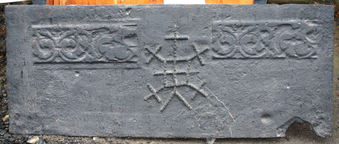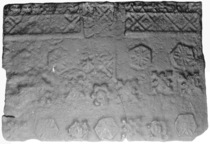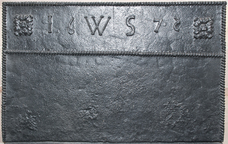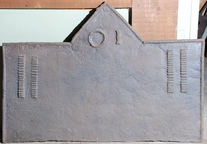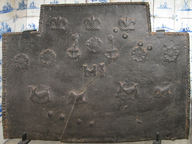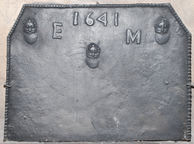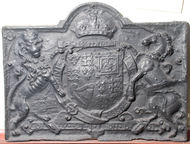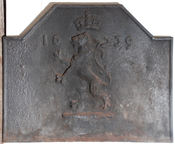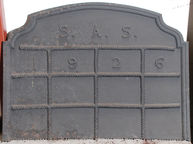-
174
Description: Rectangular; plain plate with central crossed-square rope pattern with crosses at the corner and top; on each side a rectangular stamp with swirled tendril, serpent and demi-cup decoration.
Notes: The crossed square was an alchemistic symbol for iron vitriol (i.e. ferrous sulphate or copperas), but the crosses at the extremities may indicate other symbolism or none; similar patterns are found on other firebacks of a group that may have been associated with Pounsley furnace, Sussex. The repeated panel at the top appears to have been formed using a mould for a section of a plasterwork frieze, resulting in an intaglio impression (approx 395 x 142mm or 15½ x 5½ in.) as opposed to the normal bas-relief; this is very unusual on a fireback. The style of the mould dates from the Elizabethan or Jacobean period. The stubs on the bottom edge are likely to have been the remains of runners where the molten iron entered the mould. Recovered from a property in Burwash, Sussex, in 1910.
- Decoration tags:
- rectangular (shape)
- none (edging)
- simple stamps
- apotropaic
- animals
- objects
Manufactured: in the late-16th to early-17th century possibly at Pounsley Furnace, Framfield in the Weald area of England.
Current location: Hastings Museum and Art Gallery, John's Place, Bohemia Road, Hastings, East Sussex, England.
Museum number: HASMG: 1910.26.1 (part of the Hastings Museum museum group)
Citation: Baines, J. M., 1958, Wealden Firebacks (Hastings Museum).
- Attached to series:
- Pounsley series
- Miscellaneous stamp firebacks
-
152
Description: Rectangular; plain plate; on top, twice repeated stamp probably formed of a section of cresting with a row of seven ?fleurs-de-lys above a diagonal grid of squares, each with a small raised square in the middle, and a horizontal astragal border below; between the cresting, a stamp of indeterminate form and design; below, four repeated hexagonal stamps, each divided into triangles by raised lines, two under each cresting stamp; between them, a stamp of indeterminate form and design, possibly the same as the one above it; below, probably six double crosses flory, with a flower head stamp between each group of three; along the bottom, two crosses flory, three hexagon stamps and two other stamps of indeterminate form and design (though different from those described above), arranged asymetrically.
Notes: A crude and poorly executed casting. Butterfield (1916) illustrated this fireback the other way up, and that is how it was displayed in Hastings Museum when it was photographed in the early 2000s. The orientation of this fireback has been reconsidered and the greater relative wear and heat corrosion of the smaller individual stamps suggests that the cresting was originally at the top of the fireback and not the bottom.
- Decoration tags:
- rectangular (shape)
- none (edging)
- carved stamps
- objects
Manufactured: in the mid-16th century in the Weald area of England.
Current location: Hastings Museum and Art Gallery, John's Place, Bohemia Road, Hastings, East Sussex, England.
Museum number: HASMG: 1911.60.8 (part of the Hastings Museum museum group)
Citation: Butterfield, W. R., 1916, 'Old Wealden Firebacks', The Connoisseur, 46, pp. 197-209.
- Attached to series:
- Miscellaneous stamp firebacks
-
1271
Description: Rectangular shape; twisted rope edging (top and sides only); central initials, WS, in different character sets, between split date, also in different numeral sets, with a rectangular floral patera repeated at each end; below, and at a slight incline to the right, a horizontal twisted rope dividing the plate. The '5' of the date has been stamped in reverse.
Notes: A boldly cast fireback with disparate character styles. Probably acquired for the castle in the early-20th century during its refurbishment for Edward Hudson by Edwin Lutyens.
Inscription: 1 6 W S 7 5 [5 reversed]
- Decoration tags:
- rectangular (shape)
- rope (edging)
- simple stamps
- carved stamps
- individual letters
- individual numbers
- text
- plants
Manufactured: in 1675 in England.
Current location: Lindisfarne Castle, Holy Island, Northumberland, England.
Museum number: 511616 (part of the National Trust museum group)
- Attached to series:
- Miscellaneous stamp firebacks
-
330
Description: Rectangular; plain edge; top centre, ring between repeated lion's head between repeated narrow human figure with folded arms standing on a bracket; below each figure, a small bracket.
Notes: The figures are indistinct and are disproportionately small for the size of the firebacks; from Isfield Place 1921.
- Decoration tags:
- rectangular (shape)
- none (edging)
- simple stamps
- carved stamps
- animals
- humans
- objects
Manufactured: in the late-19th to early-20th century in England.
Current location: Horsham Museum, Causeway, Horsham, West Sussex, England.
(part of the Horsham Museum museum group)
- Attached to series:
- Miscellaneous stamp firebacks
-
333
Description: Rectangular with triangular extension at middle of top edge; rope edging (top and sides); inscription in triangle - O larger than I; a pair of vertical, parallel ratchet bars (180mm long) below each top corner.
Inscription: O I
- Decoration tags:
- rectangular with triangular arch (shape)
- rope (edging)
- simple stamps
- text
- objects
Manufactured: in the late-16th to early-17th century possibly in the Weald area of England.
Current location: Horsham Museum, Causeway, Horsham, West Sussex, England.
(part of the Horsham Museum museum group)
- Attached to series:
- Miscellaneous stamp firebacks
-
942
Description: Rectangular with a central rectangular extension; twisted rope edging; fleur-de-lys stamp with twisted band repeated three times at top; ?rose stamp repeated five times in line below fleurs, some over pressed, central rose above others; cabled anchor stamp repeated twice, either side of central rose; initials below central rose; ?cow and dog stamps each repeated twice alternately in line below initials; eight rivets from later repair.
Notes: None of the stamps is known from any other fireback; cabled anchor may suggest a connection with a seaport.
Inscription: HI
- Decoration tags:
- rectangular with square arch (shape)
- rope (edging)
- simple stamps
- carved stamps
- individual letters
- heraldic
- text
- animals
- plants
- objects
Manufactured: in the early-17th century in England.
Current location: Wilberforce House, High Street, Kingston upon Hull, Yorkshire, England.
(part of the Hull Museums museum group)
- Attached to series:
- Miscellaneous stamp firebacks
- Fleur-de-lys firebacks
-
356
Description: Canted rectangle; twisted rope edging (top and sides); bearded face stamp repeated in top corners and below inscription; date along top edge; initials split by date and slightly below.
Notes: The distinctive style of the ‘4’ in the date and the bearded mask stamp have also been noted on a fireback at Callow Farm, Dymock, Gloucestershire, associated with the operator of the Newent furnace.
Copies of this fireback are known.
Inscription: E 1641 M
- Decoration tags:
- rectangular with canted top corners (shape)
- rope (edging)
- carved stamps
- individual letters
- individual numbers
- text
- humans
Manufactured: in 1641 probably at Elmbridge Furnace, Newent in the Forest of Dean area of England.
Current location: Baddesley Clinton Hall, Knowle, Warwickshire, England.
Museum number: 342876 (part of the National Trust museum group)
- Attached to series:
- Miscellaneous stamp firebacks
-
405
Description: Arched rectangular shape with small rhomboidal flanges in the corners of the arch; cavetto moulded edge on all sides; Stuart royal arms (1605-88, 1702-14) with lion and unicorn supporters, garter, crown and motto; raised inscription in a tapering label beneath crown.
Notes: An amended copy of a 17th/early 18th century original (see no. 633). The added inscription has been impressed with the personalised cast handle of a cooking vessel. A bronze skillet bearing the inscription 'STANDEN 1726' on its handle has been recorded elsewhere, but the impression on the fireback has been formed from a handle with the inscription inset in relief, whereas the 1726 inscription is inscribed. Also the lettering on the handle used to personalise the fireback, which includes the letter A surmounted with a horizontal line, is of an earlier style. Three members of the Standen family, Thomas, James and Elias, were founders at Beech or Robertsbridge furnaces, Sussex, 1728-9, and a John Standen was casting skillets at Heathfield Furnace in the early 1730s; each could have been the founder of the 1726 skillet, but the maker of the handle used in the fireback casting may have been earlier. Formerly at Marshalls Manor House, Maresfield, Sussex.
Inscription: IAMES STANDEN [+Garter and royal mottoes]
Arms: English Stuart royal
- Decoration tags:
- rectangular with round arch (shape)
- cavetto (edging)
- carved pattern panels
- whole carved pattern
- armorial
- royal
- text
Manufactured: in the late-17th to early-18th century in the Weald area of England.
Current location: Anne of Cleves House, Southover High Street, Lewes, East Sussex, England.
Museum number: LH000.943 (part of the Sussex Archaeological Society museum group)
Citation: Dawson, C., 1903, 'Sussex Iron Work and Pottery', Sussex Archaeological Collections, 46, pp. 1-54.
- Attached to series:
- Stuart royal armorial firebacks
- Miscellaneous stamp firebacks
-
438
Description: Rectangular with three sided arch; astragal edging; lion rampant crest beaneath a crown; the date split either side of the lion's head.
Notes: The evenness of the casting, the form of the crown and the lion all suggest that the date is spurious.
Copies of this fireback are known.
Inscription: 16 39
- Decoration tags:
- rectangular with three-facetted arch (shape)
- astragal (edging)
- carved stamps
- individual numbers
- heraldic
- royal
- text
Manufactured: in the early- to mid-20th century in England.
Current location: Anne of Cleves House, Southover High Street, Lewes, East Sussex, England.
(part of the Sussex Archaeological Society museum group)
- Attached to series:
- Miscellaneous stamp firebacks
-
440
Description: Rectangle joined to low arch with cyma recta curves; ovolo-moulded edging (top and sides); grid of twelve rectangles (4 columns of 3) with twisted rope borders; initials in arch, date in top line of rectangles.
Notes: A fireback cast specially to mark the 60th anniversary of the Sussex Archaeological Society, and donated to the society by Mr John Every.
Inscription: S.A.S. / 1926
- Decoration tags:
- rectangular with canted top corners and round arch (shape)
- ovolo (edging)
- simple stamps
- individual letters
- individual numbers
- text
- objects
Manufactured: in 1926 at Phoenix Foundry, Lewes in the Weald area of England.
Current location: Anne of Cleves House, Southover High Street, Lewes, East Sussex, England.
Museum number: 1944.24.093 (part of the Sussex Archaeological Society museum group)
- Attached to series:
- Miscellaneous stamp firebacks
